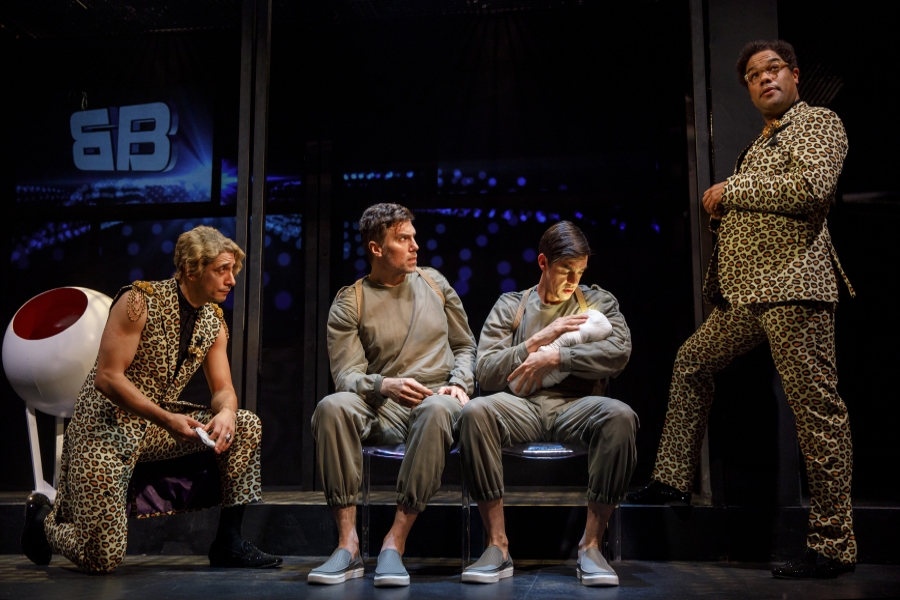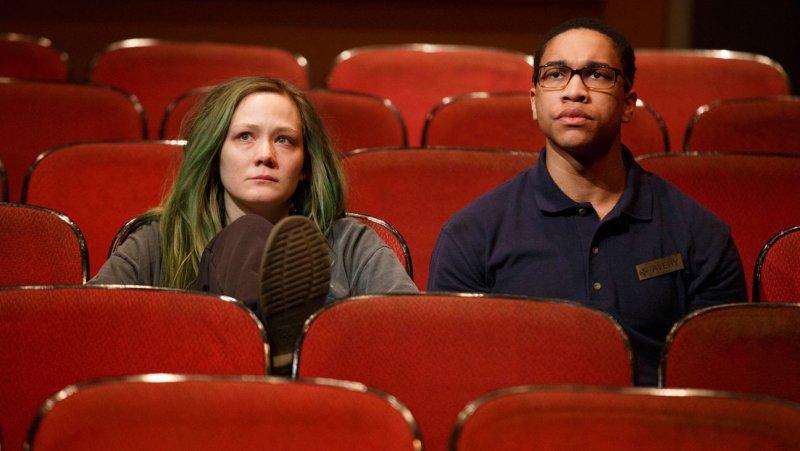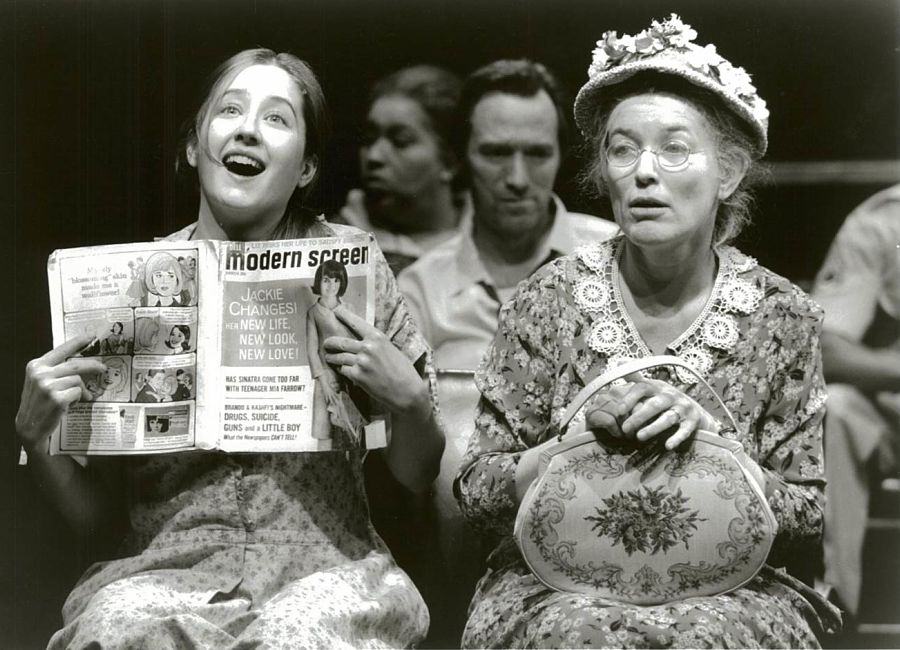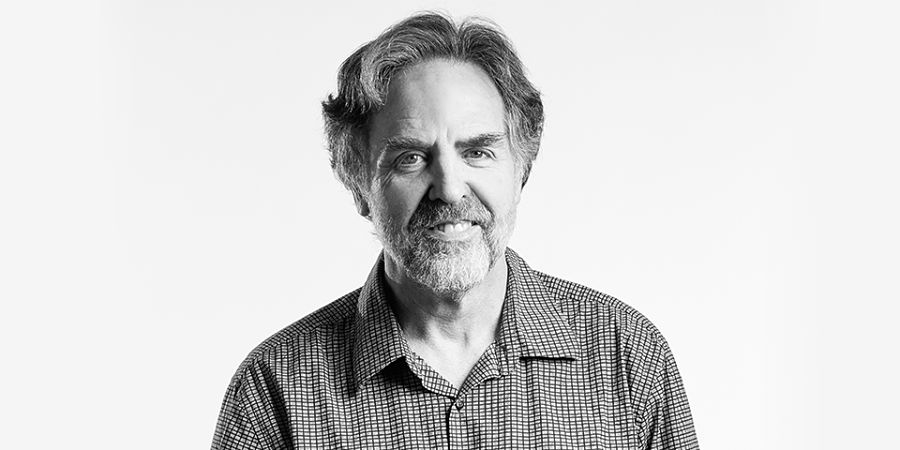Tim Sanford and I were supposed to get coffee and talk about religion—a theme I’d seen recur with unmistakable regularity at the Off-Broadway theatre he’s run for 23 years, Playwrights Horizons (and which he just yesterday announced his departure from at the end of the season after next). The theatre’s current occupant, Will Arbery’s excellent, fine-grained Heroes of the Fourth Turning, about conservative Catholics hashing out their political and spiritual differences, is just the most recent example of a strain I’ve long noticed in Sanford’s programming, from Saved to The Savannah Disputation to The Christians to 100 Saints You Need to Know to Grand Concourse to A Strange Loop—I could go on, and in fact Sanford arrived for our interview with a scrawled list of Playwrights offerings he thought fit the theme as well.
That piece on religion/spirituality-themed plays is scheduled to come out soon in America, the Jesuit weekly I occasionally write for. But as I’d never before had the chance to sit down and talk at length with Sanford—a tall, bearded figure with a California-casual mien that belies a certain caginess—the conversation ranged widely over his two-decade career at the theatre, with a glance into the decade before, when he started there as a literary intern under previous artistic director Andre Bishop (since ensconced at the helm of Lincoln Theater Center). Sanford was frank and forthcoming, yet true to circumspect form he gave no inkling that he’d soon be announcing he’d leave the theatre where he programmed three Pulitzer winners and a few Broadway transfers, and for nearly a quarter century has made a uniquely consistent New York home for serious, adventurous new plays by living American writers.
Our interview has been condensed for length and clarity.
ROB WEINERT-KENDT: I’d love to know a little more about what makes you tick and how you pick the plays on your stages, because your theatre is—I wouldn’t say disproportionately influential, but it’s pretty influential, looking at the plays you’ve produced and careers you’ve helped launch.
TIM SANFORD: Well, I’m glad you find it proportionally influential.
I mean, it’s a major theatre—it was before you took over, and you kept up its stature. Places like Soho Rep or Clubbed Thumb, I’d say, could be considered disproportionately consequential because of their relative size. So you trained partly as a director, didn’t you? But you don’t direct at your theatre.
My graduate studies were mostly literary criticism, with some directing. Not real directing, not MFA level. It couldn’t be if you were actually getting a Ph.D., right? But there was some directing every year, and I did a thesis production of The Seagull, for example. The directing was really geared toward future professors, and figuring they would make their candidates more hireable if they were more versatile and could direct as well as wax pedagogical.
The ostensible subject of this interview is spiritually or religious-themed plays at your theatre—which can be traced from Violet, in your first season, all the way to Heroes of the Fourth Turning—and I wonder more generally if you think of your programming in terms of thematic slots.
No, I just pick the plays. I mean, I can’t write the plays, you know? And there’s not a playwright on the list where you think, “Oh, he or she only got the job because he likes the theme.” I did feel called after the Trump election to try and do something, so I did plays that were topical in certain ways: Mankind felt topical, This Flat Earth felt topical. I think the best way to really answer back the world is to write a good play, not to turn a pamphlet into a play.
That’s like something Kenneth Lonergan once said: If I’ve got something to say, why don’t I just say it rather than spending two hours pretending other people are saying it.
There’s also a literary criticism/philosophy argument called the heresy of paraphrase.
I don’t know about this, tell me more.
Cleanth Brooks argued that art is not paraphrase-able, or if it is—if that’s it’s goal, to give you a message or something you can boil it down to—it can’t possibly be a good play. I’m constantly protecting my playwrights at talkbacks. When someone is like, “What did you mean by blah blah blah?” No writer has ever answered that question.

So let’s just go back for a minute. You started it in the 1980s at Playwrights under Andre Bishop?
Yeah. First I was under Eric Overmyer, who was the literary manager, and when Eric left, I took Eric’s job and Andre was my mentor.
What was your main takeaway from those years? What did you learn from Andre?
There’s just such a high-level thoughtfulness to what he does. I was shy as an intern, really. And the way I tried to communicate with Andre was by writing notes. He appreciated the notes. And then they grew into conversations.
He was making art with colleagues, people who are now giants in the field. They were all new to each other and they grew together. As with a lot of new theatres, if someone wants to start a theatre, they do it with their friends, right? Then, when it starts to kick in and become in people’s spotlight, you feel called to expand what you’re doing. For example, the notion of diversity back then was, like, maybe I’ll do a woman playwright, you know? And there was some vague call to diversify by ethnicity as well, but no one felt any pressure to do it. And it was a very rare thing. At one point Andre said to me, “You know, they call us Gay Whites Horizons. Black playwrights’ agents don’t even bother to submit plays to us. Could you go on a project to discover some writers who are up and coming?” I started a group and met writers like Kia Corthron, Lynn Nottage, Michael Henry Brown. That imprimatur came from Andre.
This was in the late ’80s, early ’90s?
This would be the late ’80s.
Things are lot different now. It seems like in the last 10 years, even just the last five years, the programming Off-Broadway, including at your theatre, has been increasingly diverse.
I’m eager to reach a point of trust so that it’s not literally quota filling, which as first it kind of has to be. Last year there were four writers of color and two white writers. And sometimes you get to a certain point in the programming and you’re like, “Okay, I can’t read any more white plays.” Maybe in the future, it can be four and two one year, three and three another, two and four. And people won’t get exercised because they know…
Because you have a track record.
The other tricky thing is how writers identify. In some sort of hardcore circles, it doesn’t matter if your playwright is a person of color if the subject is not POC enough. Dan LeFranc, for example, is a Latinx writer. He doesn’t self-identify as that, and you can barely get it from his plays unless you know him. Like Rancho Viejo had a character who only spoke Spanish, and she was the most high-class, snobby person on the stage. He was writing against stereotypes. But you don’t really get credit from those who are keeping score. And there are those keeping score.
Anyway, you were asking me what I learned from Andre. Two things: the call for diversity. But also Andre led me, in a way, to my decision to build a new building. He took me to see Our Country’s Good together at Hartford Stage, which he heard was really good, and it was great. But it had a wrecked boat on the set, so it was not a play that Playwrights Horizons could do. And I think he was feeling constrained. The theatre’s house style then was the urban, cynical, literate, gay writers like Durang, Innaurato, Harry Kondoleon…Andre was hungering to expand the scope of his work to do a greater variety of kinds of plays. That may have been what made him open to the Lincoln Center job. I later personally felt the limitations of the space at Playwrights Horizons when I produced Cloud Tectonics and Freedomland. So we tore down the theatre and built a bigger space on that spot—it was very dramatic when we tore it down.
You said that you directed a long time ago. I’ve noticed that most big New York theatres are not run by working directors, except for Lynne Meadow at Manhattan Theatre Club, and occasionally Oskar Eustis at the Public. And it does seem like now, with the likes of Stephanie Ybarra at Baltimore Center Stage and Joanna Pfaelzer at Berkeley Rep, that the rest of the country is catching up with New York.
Jim Nicola, when I first met him, he directed. And Oskar, when he got the job, he said, “Well, I’m sure they’ll never let me direct again,” but that proved not to be true. And Lynne Meadow, as you say. My own view of myself is just that I’m not as good. I am curious, since I haven’t directed in 20 years or whatever, I wonder, how would I do? If I got really strong designers, could I still talk to them? But you really have to hustle as a director. And I made a conscious decision at a certain point to not be doing that 80-hour week, and two jobs at once, because frankly, the work that Playwrights Horizons was doing was so much more important and satisfying. And I felt like I was actually legitimately a part of it, even though I was just giving notes.
Do you believe we’re in a golden age of playwriting? I don’t know if I’ve heard you say those words before, but many folks have said it.
Yeah, I think it’s great.
Indeed it’s been sort of conventional wisdom for nearly a decade. Do you think we’re still in it, or has it changed?
We’re in a correction. I think the diversity movement is making a correction, which is really important. My answer to people, when they would praise me for doing women writers when other people weren’t, would be, “Look, I’m firstly about new writers.” And the fact is that the writing programs have become more diverse and more gender-equal, which makes it easier for me to be. But I do feel like there’s really a robust environment for writers right now.

I’ve never had the chance to ask you about the controversy over The Flick, when walkouts and patron pushback prompted you to send a letter to reassure subscribers and explain why you programmed it. Some people thought you were apologizing for Annie Baker’s work. Do you feel like you were misunderstood?
We were freaking out and I don’t think we made a measured decision. I think we acted hastily. I think it was naïve, because we sent them as letters, we didn’t send emails, but people got them and then they emailed them—it was my first example of something going viral, right? I’d say the worst offense on my part in all of that was the naïvete, thinking that I was only talking to some subscribers when I was talking to the world and The New York Times. And I didn’t tell Annie I was going to do it, and that’s inexcusable. That’s my biggest shame out of that whole thing. The letter itself was fine.
Yeah, I loved the play but I could see both sides of your predicament, honestly.
It could be misinterpreted if people were looking for dirt. But I still don’t quite understand why that play bothered people so much. It was a play she wrote on commission for us. I held a slot for it because Circle Mirror Transformation was so great, and I just had high hopes for the next one. And I read it and was like, “Fuck, she wrote the great American play.” I saw nothing wrong with it. I saw only the magnificent leap this writer had made. So the fact that 50 people out of 190 seats would walk out—it freaked me out. That season included Detroit, which Charles Isherwood loved, and an Amy Herzog play, The Great God Pan, that he also loved. He literally, in his fall preview that year, said, “Go see everything at Playwrights Horizons.” We got 1,000 more subscribers that year. And what a horrible thing to happen! It was like: “Oh, you’re those people who are just here because Isherwood told you it was great, but you have no actual taste of your own, right?” So the next year I programmed Patron Saint of Sea Monsters and Your Mother’s Copy of the Kama Sutra because they were both really dirty. I thought: Let’s get the rest of these people out of here.
Do you really think that way?
I’ll tell you, the first season I programmed, I did a Nicky Silver play, a Jose Rivera play, Cloud Tectonics, and I thought Violet was a can’t-miss play, right? I got one good review for a Peter Hedges play, but otherwise my first season was completely rejected. So the next year, I was like, “Fuck you, I’m going to do only plays that The New York Times doesn’t like.” I did a Lynn Nottage play because her play Por’Knockers had been beaten up, and I did a Tom Donaghy play because his play Northeast Local had been beaten up, and I did a Christopher Kyle play because his play Monogamous had been beaten up. So I am not averse to being perverse.

Was The Flick the biggest controversy you’ve seen in your time?
I had one year where I had the chance to do a very safe play—it had been done at Louisville and it got a good review and there was some commercial enhancement. And I thought, “Well, this is kind of a crowd pleaser and it’s funny and I’ve known the playwright a long time.” But doing that play meant turning down this Craig Lucas play, The Dying Gaul, which I was kind of afraid of, because I thought it was so misanthropic, really. And then I saw it at the Vineyard and I thought to myself, “You are chickenshit, and don’t ever let that happen again.” So I did Betty’s Summer Vacation the next year. And I remember I was standing in a line in an airplane flying across the country and got into a little conversation where someone asked, “What do you do?” And I said, “Artistic director, Playwrights Horizons,” and the man literally said, “Why did you do that play!?”
Seriously?
He literally barked at me.
I love that play and wish someone would revive it. I think people could handle it now.
No one had a problem with it. I mean, some subscribers did, but I think those guys are dead now.
Let me ask you about the relationship with the subscribers. Do you have the freedom to program what you want, up to a point, because you have subscribers? Or can you not rely on that?
Subscribing is a waning model, you know? I wish there was something I could say to younger people to persuade them to invest, be partners with us, believe in us. Otherwise I don’t know what to do. We’ve gotten better at target marketing and using social media and dynamic pricing to make up the difference, which is okay. But nowadays, you don’t just need a good review; it literally needs to say, “You have to put down whatever you’re doing right now and go run to the internet and buy a ticket because this play will change your life.” Anything short of that does not result in a ticket sale.
You mentioned enhancement money. Is that a part of your season regularly?
I just dab my toe in it. I haven’t done it for a straight play. I think I did have one person who approached me, and was like, “Can I please give you $100,000?” But I don’t pursue it, and I wouldn’t do a play because it had enhancement. We’ve had a partnership program with Mellon for musicals—there’s one more coming, I can’t tell you what it is, but hopefully it will be done next year.
With musicals you usually have to partner with an outside producer, right?
Usually. If it’s smallish, I can do it without that—Fly by Night didn’t require money, Iowa didn’t. A Strange Loop did, and that was a very good partnership. I’ve met plenty of commercial people who are on the ball and good people and honorable and smart, and I would not think anything bad of the theatre if we had a relationship with one of them. But it’s tricky when you start changing your programming to do something someone asks you to do. Sometimes it’s maybe okay because you like the writers or whatever. And it’s also really hard the other way around, to have a musical you love and to find someone who’ll help you do it. They usually sense, “Oh, this guy wants to do this play no matter what.” They’re businessmen and businesswomen.
Looking back over the years, do you feel like you’ve been programming not just seasons, but a kind of body of work as a producer over time? Do you ever step back and take stock that way?
I think only someone like you is thinking of that.
Okay.
That was a compliment. But do you think that the average subscriber of Playwrights Horizons is thinking…
Not subscribers—I’m asking if you think that way.
Oh, do I think back on the body of work? That’s an interesting question. I don’t want to say no, because I’m sure part of me does think about it. And I’m starting to think about books I want to write, you know? I do think that theatre is the only art form that uses human beings as its clay. And of all the philosophers out there, the most influential philosopher for me is Henri Bergson. His view of time was not linear, it was volumetric. He thought of time as being something that fills up the vessel of the person. And that’s Proust’s whole thing too: It’s not linear, time doesn’t go away, it’s not discrete. It’s interpenetrating.
So I do think that when you’re working on plays, for the actors, it’s inside of them somewhere. And the change that is effected on them is cumulative. It’s one of the things I love the most about A Strange Loop, its view of change. Did you ever watch “Russian Doll”?
Yeah, I loved it.
“Russian Doll” has that thing of repeating time but something changes. It’s analogous to a play structure. Like, the actor repeats the same thing over and over, right? But we actually learn things and those get added to us and become a new reality. And so yes, I do think that all of those plays are inside me somewhere.
And inside the audiences that saw them, right?
Yeah. Without getting too sentimental about it.


